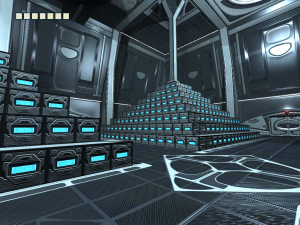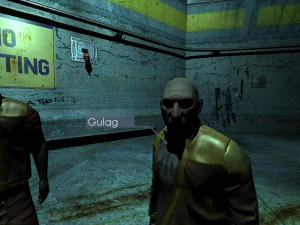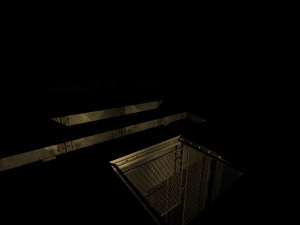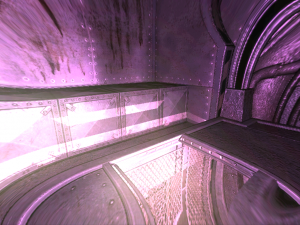TCoR:EfBB: Final Thoughts and Apologies
All in all, The Chronicles of Riddick: Escape from Butcher Bay is a pretty satisfying diversion. It’s mostly quite linear, but it uses that to force the player through a good variety of play styles, from crawling around in ducts to piloting unwieldy riot mechs. It’s like the Half-Life games that way, but shorter and with a slightly more talkative hero.
I think I owe the game an apology or two. I said some thoughtlessly mean things about it in my first post that it doesn’t really deserve. Like about the profanity. There’s swearing throughout the game, but most of it’s much more natural-sounding than the bits I complained about at the beginning, unless I just got used to it or something. It probably helps that most of it is screamed at you by people who are trying to kill you. Also, that crack I made about spending most of the acting budget on paying Vin Diesel? As Ellison pointed out in the comments, Mr. Diesel in fact founded the production company responsible for the game. This certainly changes his imagined relationship to the game, but I’m not sure it really casts him in a better light — “Let’s form a studio to make games about ME!” They’re even purportedly also producing a game about one of his D&D characters.
The idea that Vin Diesel plays D&D at all is a bit of a shock. I mean, his best-known roles are pretty firmly on the opposite side of the Geek/Jock divide. Perhaps I’ve underestimated the man. I regarded him as just another Hollywood action star, but a quick look at Wikipedia reveals things about him that I didn’t know (or perhaps used to know but forgot; I don’t exactly keep track of celebrity gossip). For example, did you know that he’s black? No, really! Or, well, it’s not quite that simple. He’s racially weirdified by the standards of present-day America, and apparently had difficulties getting roles before he became a star, because he was considered not white enough for roles that weren’t specifically black, and not black enough for ones that were. He even made a semi-autobiographical film about this experience, which impressed Steven Spielberg with its poignance. Poignance? In a Vin Diesel flick? I had no idea it was in his range. As Riddick, he delivers all his lines in an affectless growl, but I suppose that’s what’s appropriate to the character. He’s the extreme tough guy, completely imperturbable, as unmoved by pain as he is by the death of others.
And that’s really what puts him on the Jock side of the aforementioned divide. Indifference is not a geek trait; the defining trait of a geek is excessive interest. I don’t think it’s unreasonable to use these terms in discussing Escape from Butcher Bay, either. The whole thing is pitched at a middle-school mentality, the sort that finds transgressive fascination in antiheroes, excessive profanity, and an “M for Mature” rating. Prison is a metaphor for school, and Riddick goes through a symbolic puberty: eyeshine is an unexpected and confusing physical change, and the one burst of Furion fury he experiences in the game is the closest someone so unemotive can get to a mood swing. Well, like I’ve said, Riddick is styled as a Campbellian mythic hero, and the whole point of myth according to Campbell is to point back at ordinary experience, to provide us with ways of understanding our own lives. So, what kind of school experience does this story resonate with? A violent one, obviously. One where you feel oppressed, and so you lash out, and you don’t care much about the little guys you hurt in the process. You’re disruptive. You’re constantly in trouble. You keep your cool, because any display of emotion makes you vulnerable. This is the world-view of the schoolyard bully. And to that audience, the game provides the reassuring promise that you can escape from violence by being better at it than everyone else.
But in that light, what are we to make of the ending? Riddick ultimately doesn’t escape Butcher Bay by punching everyone until they let him go, but by a ruse, in which he cooperates with Johns, the bounty hunter who brought him there in the first place. Johns is actually instrumental in recapturing Riddick throughout the game, but grows disgruntled by the extra work and lack of payment, and at some point is threatened with being imprisoned himself, on a pretext I’ve already forgotten, but probably more because it’s the easiest way to get out of honoring Riddick’s bounty. I suppose Riddick had earned Johns’ respect as an adversary or something, but at the very end, he straps Riddick into his restraints again and just takes him off to some other prison. Again, I think of the way Riddick kept surrendering at the end of each chapter, after facing much worse things than Johns. Perhaps he has some undisclosed personal reason to do this? Heck, maybe they’re in cahoots, doing some kind of bounty-oriented swindle like Clint Eastwood in the beginning of The Good, the Bad, and the Ugly. Except I think he’s the same bounty hunter as in Pitch Black, and I don’t think it this speculation jibes with their relationship there.
 Comments(1)
Comments(1)



